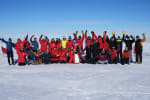Beneath 1.5 kilometers of ice near the geographic South Pole, the IceCube Neutrino Observatory is on the hunt for ghost particles.
As the world’s first gigaton neutrino detector, IceCube is used by astrophysicists to better understand cosmic objects by observing the neutrinos — abundant, nearly massless, and mysterious elementary particles — that they produce. […]









